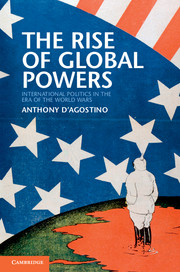Book contents
- Frontmatter
- Contents
- Maps
- Acknowledgements
- Introduction
- 1 The great powers at the dawn of world politics
- 2 Global origins of World War I: from the China scramble to the world crisis of 1904–1906
- 3 Global origins of World War I: a chain of revolutionary events across the world island
- 4 Balance and revolution, 1914–1918
- 5 A ragged peace, 1919
- 6 Scramble for Eurasia, 1919–1922
- 7 Drastic acts of unhappy powers, 1922–1923
- 8 Storms in the lull, 1924–1927
- 9 Politics and economics of the great slump, 1928–1933
- 10 A vogue for national economy
- 11 Mussolini’s moment, 1933–1935
- 12 The global civil war, 1936–1937
- 13 Last years of peace, 1937–1939
- 14 The European war, 1939–1941
- 15 The world war
- 16 Balance and hegemony
- Maps
- Notes
- Index
9 - Politics and economics of the great slump, 1928–1933
Published online by Cambridge University Press: 05 June 2012
- Frontmatter
- Contents
- Maps
- Acknowledgements
- Introduction
- 1 The great powers at the dawn of world politics
- 2 Global origins of World War I: from the China scramble to the world crisis of 1904–1906
- 3 Global origins of World War I: a chain of revolutionary events across the world island
- 4 Balance and revolution, 1914–1918
- 5 A ragged peace, 1919
- 6 Scramble for Eurasia, 1919–1922
- 7 Drastic acts of unhappy powers, 1922–1923
- 8 Storms in the lull, 1924–1927
- 9 Politics and economics of the great slump, 1928–1933
- 10 A vogue for national economy
- 11 Mussolini’s moment, 1933–1935
- 12 The global civil war, 1936–1937
- 13 Last years of peace, 1937–1939
- 14 The European war, 1939–1941
- 15 The world war
- 16 Balance and hegemony
- Maps
- Notes
- Index
Summary
Our inquiry now turns to the Great Depression, the watershed in the period between the world wars, a suspect in the search for the main cause of World War II. How could the war have resulted, we now have to ask, if the depression had not cast Europe and the world into financial ruin and driven Germany into the arms of Hitler? Or, another way of putting the question: At the end of the 1920s Europe was solving its problems. If it had not completed its convalescence from the Great War, it was at least well on the way to recovery. Locarno meant the peaceful revision of the Versailles peace settlement. Germany would soon regain something roughly approximating its boundaries and European interests as they existed in 1914. France and Britain would have helped guide the process with the United States backing them. The statesmen of the Locarno era, even the revisionist Stresemann, harbored no real animus toward war, certainly not the type of war that occurred in 1939–45. It was only the crash of 1929 and the Great Depression that ruined everything.
This idea has for good reason been an attractive one for historians, as it was for those who lived through the period. The revival of Europe and the maintenance of its hold on the rest of the world seemed assured at the end of the Locarno honeymoon. Europe had defied those who predicted the demise of the white man. Europe’s share of world trade, as we have seen, down to 41 percent in 1920, was back to 51 percent in 1929. European holdings in Asia and Africa also seemed to have been retained, sometimes with force, sometimes with bargaining. Britain appeased Chinese nationalism by yielding Hankow and control over China’s customs, thus securing its surpassing interest in Shanghai and the other treaty ports. The empire had a firm hold on India where there could be no comparable Soviet help to the nationalists. Sixty thousand British troops and as many colonists still managed to direct a country of 300 million. The Montagu–Chelmsford constitutional reforms of 1919 promised some of the outward appearances of elections and popular assemblies. Gandhi and supporters of his noncooperation campaign continued to fight for independence but there were more moderate voices among the nationalists to balance him. Indian Muslims also had to be considered, with their distinct interests and outlook. The British seemed able to divert these various forces from forming a united front against them.
- Type
- Chapter
- Information
- The Rise of Global PowersInternational Politics in the Era of the World Wars, pp. 215 - 247Publisher: Cambridge University PressPrint publication year: 2011



